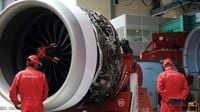On April 16, 2025, Pascal Praud, in his editorial for l'Heure des Pros, addressed the controversial decision by Safran, a prominent aeronautics and defense company, to withdraw plans for a new factory in Rennes, France. This decision came after a poor reception from local ecologists who opposed the establishment of the industrial site.
Olivier Andriès, the CEO of Safran, expressed his frustration over the reaction of Rennes' elected officials when the company announced its plans in February 2024. The proposed facility, dedicated to manufacturing turbine blades for aircraft engines, was set to create approximately 500 jobs by 2029. However, local ecologists criticized the project, claiming that it would pollute the environment and was not aligned with future sustainability goals.
During a session of the National Assembly's commission of inquiry into the obstacles to reindustrialization in France, Andriès made a decisive statement: "For me, it is no longer a question of investing in France in a city held by an ecologist majority." This comment underscores a significant shift in Safran's investment strategy, as Andriès vowed to exclude any city governed by a majority of ecologists from future considerations.
The factory in Rennes, which was to be built on a former Stellantis site, represented an investment of 80 million euros and was designed to comply with the zero net artificialization of land (ZAN) law. Despite its environmental compliance, the project's announcement triggered backlash from local ecologists who claimed, "It's scandalous, it's aeronautics, it's the plane, they will pollute, and then it's military, it's not good," as reported by Andriès.
Andriès recalled the hostility directed towards Safran during the announcement, stating, "If it’s to be greeted with tomatoes when creating 500 jobs in a region, it’s not worth it." This metaphorical reference to being pelted with tomatoes signifies the negative reception and fierce criticism the company faced from environmental activists.
The CEO emphasized that his decision to avoid cities with ecologist majorities is not politically motivated. Instead, he argued that such attitudes disregard the national interest and the importance of job creation in local communities. "When we forget the national interest and have a selfish attitude, it’s not worth it," he concluded.
The situation in Rennes has sparked broader discussions about the relationship between industrial development and environmental concerns in France. Critics of the ecological movement argue that stringent environmental policies can hinder economic growth and job creation, particularly in regions that rely on industrial investment.
Andriès' remarks have resonated with some political figures, including Alexandre Loubet, a deputy from the National Rally who has called attention to what he describes as "punitive ecology" that obstructs reindustrialization efforts in France. Loubet's comments reflect a growing sentiment among certain political factions that view environmental regulations as impediments to economic progress.
Despite the backlash, the project in Rennes had garnered support from local officials, including Nathalie Appéré, the socialist mayor of Rennes, who had worked with Safran to develop the proposal. The factory was expected to play a crucial role in producing engines for military and civilian aircraft, including the Rafale and Airbus A320.
The controversy surrounding the factory highlights the ongoing tension between economic development and environmental stewardship in France. As the nation grapples with climate change and the need for sustainable practices, the debate over industrial projects like Safran's in Rennes may serve as a litmus test for future investments.
As Andriès moves forward with his strategy of avoiding ecologist-majority cities, it raises questions about how companies will navigate the increasingly complex landscape of environmental regulations and public opinion. Will this lead to a significant shift in industrial investment patterns in France? Only time will tell.
In conclusion, the Safran case illustrates the delicate balance that must be struck between fostering economic growth and addressing environmental concerns. As companies like Safran reassess their investment strategies in light of community reception, the broader implications for France's industrial future remain to be seen.




